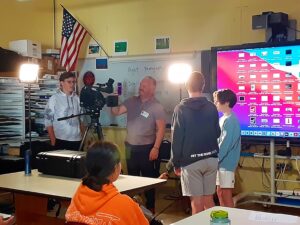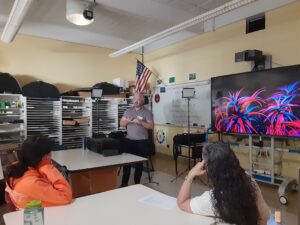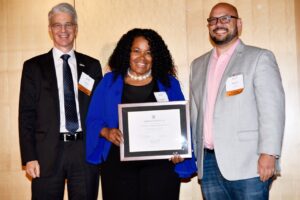 In 1997 BBC video journalist James Cooke was asked to move from London to New York for six months to help in the network’s Manhattan branch At the time, he had no idea those six months would turn into twenty-five years, in which he would travel all over the world covering stories.
In 1997 BBC video journalist James Cooke was asked to move from London to New York for six months to help in the network’s Manhattan branch At the time, he had no idea those six months would turn into twenty-five years, in which he would travel all over the world covering stories.
Mr. Cooke recently visited film students in Briarcliff High School to share his experiences working for the BBC and shooting news stories. He even helped the students create videos of their own.
Students in Jamie Mandel’s Introduction to Film Class, as well as members of the Future Filmmakers club, had the chance to learn what it is like to work on a news crew for a major broadcasting company.
Mr. Cooke began by speaking about his background. Originally from Wales, he was working in the BBC London office when he got the call to help in the New York office. He now lives in Sleepy Hollow and works for the New York News Bureau for BBC news, covering mostly the Tri-State area, filming and editing stories and news reports.
“Fifty percent of what I do is shoot videos,” he said. “The other fifty percent is editing the videos.”
Mr. Cooke explained in detail how a news segment is created.
“A senior executive will say, ‘we need a story on this subject,’ and give me a timeframe,” he said. “It can happen any time of day, often early in the morning. I work with a team that includes a camera operator (me), a reporter, who is the on-screen narrator, and in some instances, a producer, who organizes the logistics.
“A producer will handle details like booking a flight or a car rental, finding people to interview, finding locations, and communicating with the team in New York and London about the story. Oftentimes there is pressure to work quickly – we typically have only a few hours to create something out of nothing and amazingly, we almost always succeed.”
 Mr. Cooke said that his least favorite part of his job is carrying a lot of gear with him on location.
Mr. Cooke said that his least favorite part of his job is carrying a lot of gear with him on location.
“I typically have to carry two cameras and four sets of lights, but over the years everything has gotten lighter,” he said.
According to Mr. Cooke, oftentimes the filming crew gets off the plane and starts to work right away.
“Working together, we have to figure out when to interview people and which locations to film. This is called newsgathering. That is how we create the story.”
Mr. Cooke showed a promo video that depicts him filming a colleague on Wall Street.
He shared a story about how he covered Hurricane Sandy and visited people’s houses, finding out what had happened to their homes. He also told stories of colleagues filming in dangerous places, such as in Ukraine, during the current war.
“People who film in war zones have to undergo security training, so only certain teams are selected to go to places such as Ukraine,” he said.
Mr. Cooke shared that he mostly creates videos for television, but sometimes also for YouTube and Facebook.
“Shooting for social media is very different,” he said. “When we interview people they have to look straight at the camera if it’s a social media segment. So this can be weird, because when you are speaking to someone for the first time, you have to say to them, ‘Can you explain about this awful thing that happened to you and look straight into the camera while you’re doing it?’ but that is how social media works,” he said.
Mr. Cooke invited students to create short video segments. Students volunteered to be a camera operator, a reporter and to hold the mic. He gave a quick tutorial to the student using the video camera.
The “reporters” had to adhere to either a 30 second or 40 second videos and Mr. Cooke was impressed that they were able to stick with the short timeframe.
Later, he answered questions from students.
“I thought it was a great session,” he said. “The Briarcliff students were very knowledgeable and switched on. They were very interested in photography, newscasting and videography and were very attentive. It was heartening to see such enthusiasm about filming, storytelling and news gathering. They have an awareness of global events, and they are bright and sharp. It’s great that they understand what is going on in the world.”
Ms. Mandel was delighted with the visit.
“I appreciate the time that Mr. Cooke took to come and speak to the students,” she said. “It was very inspirational and informative.”







